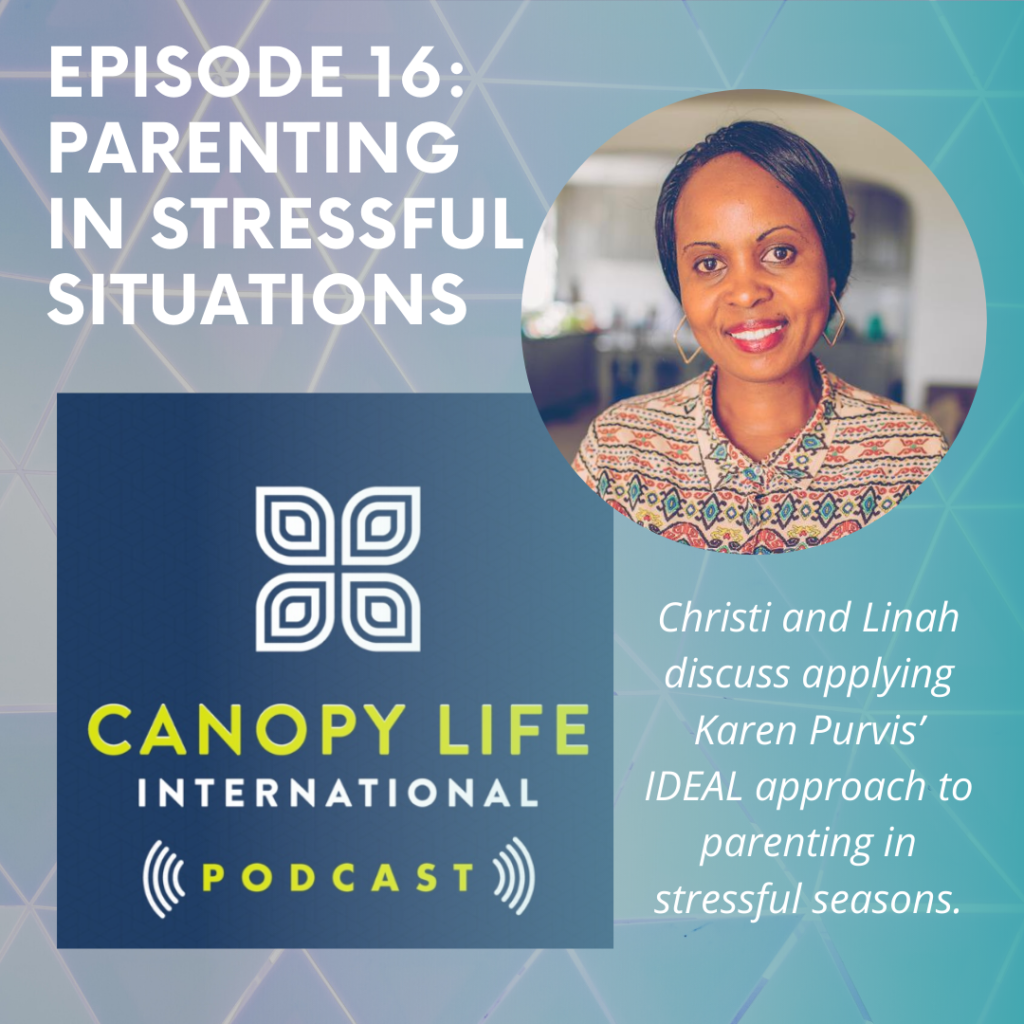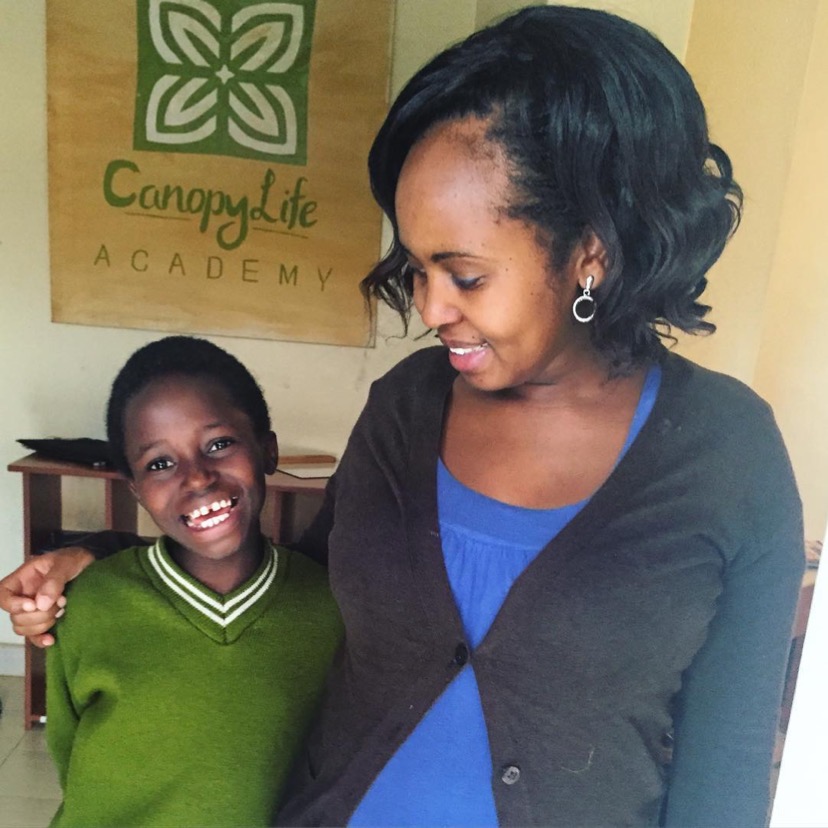In Episode 16 of the Canopy Life podcast, Christi and Linah Njeri, Canopy Life mentor and counselor, discuss Karyn Purvis’ I.D.E.A.L. response to a child’s behavior and what it looks like to parent in stressful situations and seasons.
Linah’s experience serving as Canopy Life’s housemother to 24 students while working as a classroom teacher and raising 2 children of her own gives her amazing insight into the challenges many of our U.S. family are facing right now.
Learning to be a balanced parent is a process. While parenting is never easy, and we’re far from perfect, having tools like the I.D.E.A.L. response can help ease some of the stress of parenting, especially in a season like our current one.
So many parents are encountering new situations surrounding the pandemic, such as virtual learning and parenting while working from home. We need each other and the wisdom our Kenyan friends can offer us to help navigate these new experiences. We found so much joy and encouragement from what Linah had to say, and we hope you are encouraged, as well!
So many parents are struggling right now with balance- for example, going from being the authoritative parent who needs control to being completely permissive. Are you seeing this in Kenyan families with schools being closed?
Linah: I think it’s the same globally. For the first time in most parents’ lives, they have not had kids with them for this long. You can see here that parents are getting overwhelmed with having children in the house… add to that the stress surrounding the pandemic…There’s a lot of stress in families.
As a houseparent, and now as a mentor and counselor for Canopy Life students, you’ve mentioned before the value of staying focused on connection and empowering students to have a voice. Why is that so important?
Linah: No matter what the children may do or how they may behave, they are still your children. It’s important that we remain connected with them however we are correcting them. At the end of the day, you don’t want a broken child. You want a built-up child. Connecting with them is the goal of parenting, no matter what they do. You want them to be whole.
When you lean towards authoritative parenting, you risk losing connection with your child. But if you lean towards permissiveness, and the child only gets what they want, you lose the chance to have the authority that could guide their growth. What’s the way forward?
Linah: We came across a method called I.D.E.A.L., created by Karyn Purvis. IDEAL is an acronym for Immediate, Direct, Efficient, Action-based, Leveled-at behavior. These are the 5 ways to approach connecting with a child:
Immediate– When a child does something, either positive or negative, it should be addressed immediately. A parent should respond to the child within 3 seconds. A child wants to be acknowledged for positive behavior. Negative behavior needs to be corrected immediately. It can be tricky. When you respond that quickly, it’s easy to react emotionally to the child. Be present, but instead of having an emotional reaction, try to respond to the child’s behavior with a question or curiosity in an effort to connect.
“When I’m acting within three seconds, I don’t have time to remember my notes. What I love about [the I.D.E.A.L. response] is that consciously, I remind myself that I have a goal to connect with a child, and I can give them a voice and still be in charge. I try to keep those goals in the front of my mind. What really matters to me is to connect with the child.”
Linah Njeri, Canopy Life Episode 16
Direct– This means to turn your body towards the child to get to the level where they are. It may mean bending down if the child is small. It’s connected to “Immediate”, in that the immediate response should be turning to face the child.
Efficient- Karyn Purvis says, “Don’t kill a moth with an elephant gun.” How I handle correcting a child should be equivalent to the child’s behavior. If I’m shouting at a child for spilling water, there may be something within me that I need to address. The child would be confused if I was shouting at them for something so small. It adds pressure to the child. Address the issue, but don’t pour your frustration on the child. At the end of the day, you want your child to have a voice and see the consequences of his or her actions. It’s also another chance to connect with that child.
Action-based– Teach a child the right body memory. For example, if a child snatches a pen from me, and immediately I snatch it back, I’m teaching that child the wrong behavior. Instead, I should hold out my palm and say, “Put the pen on my palm.” And I point at my palm. They may be slow and take some time. You might have to say it slower and firmer, but they will put it back.
Leveled-at behavior– When addressing an issue, I should focus on correcting the behavior and not label or attack the child. There’s a preteen boy at Canopy Life that stole another child’s book in a rough way. I helped him see that his action was the result of an underlying issue, which he was not willing to admit the first time I addressed the issue. Because we talked through the issue, he was able to see that his actions were from anger. We were able to explore how he could ask for something back instead of snatching it back in anger, where [the anger] was coming from, and other ways to respond when he’s angry. I was happy with the result because I was able to see that the correction was leveled at the behavior and not the child. I did not label him as a bully because of that incident.
You can Find Karyn Purvis’ book, “The Connected Parent” on Amazon.

What are some practical things to help parents remember not to react emotionally when correcting behavior?
Be present immediately. Take a pause. Give yourself a breath to collect yourself. Then, get to the eye level of that child. You may not even have to say anything. Your presence means so much to that child at that moment.
Draw up a breath prayer. One word. Even just, “Help me, Jesus” or “Holy Spirit, come down.” Or even the word “connect” can be the prayer. Ask Jesus to give you the power to help you connect with your child, instead of control or guide, instead of permit.
Remember, parenting is a process.
Of course, it makes sense as to why this approach is called “ideal.” It can be difficult to always be present with your child the moment a behavior needs to be corrected. The reality is that the more we know what we’re supposed to do, the more we’re aware that we fall short. The best thing is to acknowledge that parenting is a lifelong process, and we are going to make mistakes.
Personally, during the pandemic, I have seen myself fall short, even with my own children at home. I’ve found it to be so powerful to apologize to the child. It’s ok when you don’t get it, but go to the child and say “sorry” and ask for their forgiveness. You’re also teaching them to ask for forgiveness.
Linah Njeri, Canopy Life Podcast Episode 16
Every parent, or adult who has addressed a behavior in a child, has felt that shame or regret when they lashed out or that creeping fear that comes in when you’ve allowed a child to get away with too much… Now, there may be patterns in place that are disrespectful or harmful to the child or to your relationship. The parent who leans more towards authoritative parenting may risk the relationship and have regrets down the road. The parent whose tendency is to be permissive may struggle with shame or fear that their child may grow up without some of the boundaries that will encourage a respectful parent-child relationship or make them a productive adult.
Even if the goal of the ideal is hard to reach, walking towards that goal will help protect a parent from some of those regrets and relationship-breaking things, that at that moment are hard to think about. Stepping towards the goal is a stepping-away from that shame and regret.
Christi Gordy, Canopy Life Episode 16
Christi and Linah dive deeper into how to apply the I.D.E.A.L. response when working with children in this week’s podcast. Stream the podcast here for more.
Curious about how you can get involved with Canopy Life?
Here are 3 ways you can make a BIG IMPACT through Canopy Life:
- Make a one-time gift.
- Join our monthly-giving community, The Village.
- Sponsor a child. This is a monthly-giving option + cultivating a relationship with that child.


